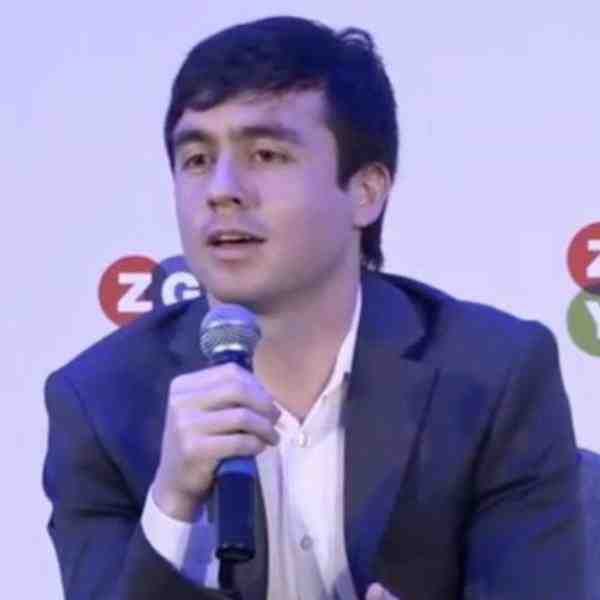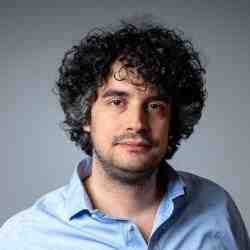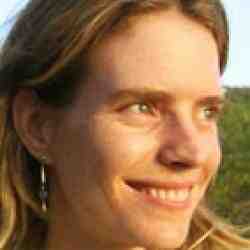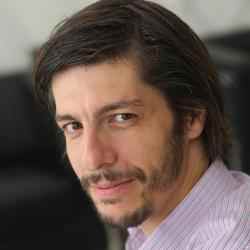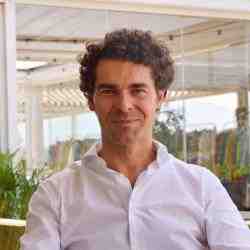Introduction
David is creating a new approach for fighting corruption in which high school and university students, especially from poor backgrounds, play a new role as watchdogs for public spending in the education system while they develop new skills and aspirations as changemakers.
The New Idea
Young people in Paraguay’s inland regions, especially those from vulnerable backgrounds, have very few spaces for developing their leadership, nor do they have incentives and opportunities that encourage them to transform their reality. The public schools they attend have an impoverished and deficient infrastructure that is exacerbated by the systemic corruption that affects the country and deepens the inequality of opportunities. In this context, David founded reAcción to promote the development of a new civic culture that engages in the fight against corruption through young people's participation. He argues that data availability and transparency on public spending is not enough to combat corruption; therefore, he developed a multifaceted strategy that includes: youth changemaking and civic participation education, developing a civil society ecosystem within Paraguay´s heartland, developing technologies based on rigorous methodologies for monitoring and visualizing public spending, and youth-led transparency and advocacy activities to reform public policy.
David sees engaging the next generations as a fundamental piece for changing civic participation culture in the country. The core of reAcción’s model is ParaguaYOite (meaning “authentically Paraguayan”), a one-year training program that prepares high school students to fight corruption, starting with the problems closest to them: their own education. The program supports young people to develop knowledge and skills that equip them to act as watchdogs, demanding greater transparency from authorities about public spending and decision making on education. For example, by accessing public information mechanisms, developing tech-enabled tools, and advocating with municipal education boards or the Mayor’s office. During this phase, students monitor the implementation of the FONACIDE— a national public investment fund and the country's main source of educational infrastructure resources—in public schools in their region. The impact does not stop when the program ends, however. David is creating an ecosystem of organizations led by the young people trained in reAcción that helps distribute leadership and install new power dynamics in the region. One example is AIGA (Open Government Alliance), the organization that has been incubated as a result of the second training phase for university students, who focus on the more sophisticated aspects of education spending. They also become trainers for the high school students of ParaguaYOite.
To deliver publicly the information developed through young watchdogging, David and his team created Quantico, a new digital media source that combines data journalism and the decentralization of media coverage from the capital city’s traditional perspective, in topics related to public policy in education and other fields.
David's model, proven to be effective in the educational sector, can be applicable for combating corruption in other sectors and territories. In 2016, he applied his monitoring mechanism to the healthcare sector and, as a result, he led the development of Paraguay’s Healthcare Ministry’s official open data tool for transparency and civic participation. Starting in 2022, as an early-stage initiative, reAcción’s knowledge, workshops, collective action activities, and tools have expanded to new Municipalities like Asunción (Capital City) and Ciudad del Este using tech and gaming, while continuing to develop a regional ecosystem of young changemakers. Through academic research and open-source tools developed by reAcción, David is generating interest in his model from youth and democracy organizations across Latin America and beyond.
The Problem
The lack of transparency in the management of public funds is a widespread issue that fuels corruption in Latin America. Paraguay’s corruption is among the worst in South America, and in 2021 ranked #128 out of 180 countries rated annually by Transparency International. David’s city, Ciudad del Este, is the second largest in Paraguay; a neighboring city of both Brazil and Argentina, it is beset by drugs and human trafficking which afflict many border towns.
The problem is particularly visible in educational infrastructure, since all funding depends on the National Fund of Public Investment and Development (FONACIDE), which allocates 90 million dollars annually, in coordination with the Ministry of Science and Education (MEC) and the Finances Ministry. Many teachers, directors, and students of the 250 municipalities of the country are not aware of the availability of these public funds and the operations that allow investment in educational infrastructure. An official ranking system for schools is currently in place to prioritize the investment of public funds, but the Ministry of Education and Sciences does not have the staff necessary to annually audit those investments. Only 11% of urban schools and less than 1% of rural schools find themselves in good conditions and meet the requirements established by the MEC for funding, and very few schools are aware of this inequity (World Bank, 2013).
The issue of educational infrastructure has a strong impact on educational quality (Wodon, 2015). Extensive literature documents the relationship between infrastructure and educational quality, especially in relation to three aspects: assistance and culmination of educational cycles, teacher's and student's motivation, and learning indicators. The corruption involved with funds designated for education in Paraguay is visible: lack of bathrooms in schools, roofs on the brink of collapsing or that have already collapsed, lack of electricity and running water, and the inexistence of classrooms and chairs for students who are forced to sit on bricks and attend classes under trees, among other examples anachronistic to the realities of the 21st century.
Another side of the problem is that young people, particularly from the heartland of Paraguay, are feeling disenfranchised and unable to influence their circumstances, and they lack access to organizations that can help them channel their interests to learn valuable skills for themselves and society. Many of these youth come from low-income families in which their parents do not have the time, information, or education to exercise their rights as democratic citizens. The spaces that do exist, like student centers, have often been co-opted by political parties. The School of Law at the National University of Asuncion as well as the National University of the East have had numerous coverages in the media linking incumbent political parties and even patronage from powerful political figures to the leadership of student councils. This serves a twofold purpose: getting votes and sustaining corrupt leadership as a result. These problems at the root of corruption in the country have been sustained over decades and have crystallized, forming part of the culture as a toxic structure that has become seemingly impossible to eradicate.
While some anti-corruption efforts exist from grassroots-focused, civil society groups dedicated to transparency and democracy, these operate with low technical capacity. The civil society organizations that have great technical capacity and resources are centralized in Asuncion, the capital city, but few of them have a strong grassroots component. The scarcity of hybrid civil society organizations (those that link technical work with community efforts) affects the feasibility of generating sustainable change. Organizations equipped with resources often generate work that highlights analysis and research, but which ends up forgotten and unseen on a web page after a public presentation, with a low likelihood that social pressure will force the system to implement the proposed necessary reforms. Meanwhile, popular organizations with strong bases successfully generate sustained mobilizations of people, yet they rarely harness strategies and budgets that could reform the system through institutional channels.
The Strategy
In David's vision, the fight against corruption will be achieved with an informed and committed citizenry, new technologies and new ecosystem dynamics. After six years of intense experimentation and learning, in 2016 David consolidated reAcción to be the only organization in Paraguay dedicated to combating corruption in education public spending while decentralizing youth changemaking, focusing on vulnerable young populations from the country´s heartland. Through reAcción, David develops a multifaceted strategy with a refined dual purpose: the fight against corruption through watchdogging, and the formation of a new civic culture among young people through changemaking education.
In order to build engagement and capacity with young students, David developed the ParaguaYOite (“authentically Paraguayan”) initiative, in which high school students participate in a 1-year training process that begins with a 3-day bootcamp. The program has a very demanding selection process where young changemakers commit not to involve themselves in party politics and prove their willingness as changemakers in a long-term plan. Each year around 40 students participate, many of them from vulnerable situations. David believes this is key to enabling the emergence of new leadership outside the established elite. Through the initiative they learn about FONACIDE, explore their interests around changemaking and learn strategies for civic engagement. As part of the training, they develop the “Week of citizen participation”, where the ParaguaYOite participants and other volunteers go to public schools to raise awareness about FONACIDE and about the importance of the law on access to public information. They stimulate engagement by activating requests for public information on public investment in their school´s infrastructure. The experience of the first ParaguaYOite cohorts showed that many principals from the neediest schools and their educational community do not know about the FONACIDE fund and the way it should benefit their schools.
Municipalities are obligated by law to provide the FONACIDE resources to their neediest schools according to the annual ranking system co-created with Ministry of Education representatives, but they have dragged their feet and taken advantage of lack of information for many years. Initially the ParaguaYOite initiative’s advocacy and demands received the information in the least user-friendly manner possible. It took reAcción more than five years of continuous, manual data collection and digitization to incorporate that information into a structured database to make it visible on a regular basis for anyone interested.
To reinforce awareness in students, David designed monitoring site visits to schools as part of students’ formative process in their cities, where they collect and then analyze the data by contrasting their findings with school rankings documented and shared by the Ministry of Education and Science (MEC). So, while reAcción denounces corruption when they find it, they also collaborate with the Ministry of Education to help identify which schools and neighborhoods that need the most investment is not receiving funding, and to flag when investments were not made according to the law. David uses this strategy to build “constructive conflict” with key players like the Ministry of Education and the National Public Procurement Directorate (DNCP): while reAcción and their community makes public where they are failing, they also develop collaborations and tools to improve in those areas. Each year they give an average of 6 workshops on open data and FONACIDE to students, educational community, journalists and general interested public, with an average participation of 15 key people with influence potential in educational institutions and media to multiply the scope of the dissemination of findings.
In 2014, David began the monitoring efforts by visiting a handful of schools on his own. Currently, reAcción physically monitors more than 50 schools in its 3 operating regions each year. However, thanks to FOCO, the software tool it developed in 2020, reAcción can now monitor the real-time investment of FONACIDE resources in all of the over 260 municipalities in Paraguay. This is important because school visits are not possible for the universe of public schools in Paraguay. In these visits, the students inform and empower teachers and administrators with data from FONACIDE, which they were completely unaware of before reAcción´s intervention. Hence, these visits help to organize and mobilize the educational community to demand the correct allocation of funds and report on the FONACIDE’s inappropriate investments. Consequently, FOCO complements this vacuum by allowing any interested community to replicate reAcción’s work despite its regional absence. Thus, this approach reduces the need for reAcción’s presence and is a cost-effective way to expand its impact to other regions
In 2019, David published an academic peer-reviewed article in an international journal about the impact of reAcción’s work and presented it in the world-renowned Open Government Summit. The research found evidence to suggest that through sustained collective action between 2015 and 2017, reAcción achieved a 400% improvement in the correct allocation of funds to the neediest schools. To make the work more accessible, attractive and scalable, in 2020 reAcción designed two new apps that became part of the FOCO tool ecosystem: the LaberINFO and FOCOapp. LaberINFO is a publicly accessible game focused on students that teaches everything necessary to monitor the FONACIDE. After piloting it in its home municipality, Ciudad del Este, in 2022 the app was promoted in Asunción and Encarnación. Although the tool is still too new to measure its impact, it has proven to generate interest in a total of 436 users from 21 municipalities.
FOCOapp resulted from reAcción’s enriched databases and the partnership it had developed with the Ministry of Education and Science (MEC). FOCOapp allows for a higher level of monitoring, beyond the financial and physical developments and towards the quality of investments. Using this app architecture and civil engineering students can collect school infrastructure data during monitoring visits. FOCOapp’s evaluation questionnaires were developed in conjunction with the MEC’s Directorates of Planning and Infrastructure to assure their credibility and enable institutional collaboration. The data generated will eventually allow for evidence-based predictions of public investment needs by municipality, the geographic identification of the most in-need areas, and the areas that have received the most funds. Because of its capabilities, the FOCO tool ecosystem is adaptable to other sectors, especially healthcare, a field reAcción had monitored in the past.
David and reAcción intend to once again apply the learnings from their work on education to the health sector to monitor the Government Health Ministry. Back in 2015, the government of Paraguay, with support from USAID, organized the Second Government Hackathon #InnovandoPy. reAcción won the Hackathon by adapting the FONACIDE monitoring mechanism to the health sector. Thus, they developed Akuerapp, which was delivered and became property of the Ministry of Health in 2016. With that they lost access to the tool (for modifications, updates and so on). During the pandemic, David promoted public pressure and efforts to use the tool to map public investment in health, but because of the big interests at stake, the state did not enable this possibility. Nevertheless, new presidential elections will be held on April 30, 2023. Two important presidential candidates approached David interested in FOCO and Akuerapp, respectively.
To deepen their strategy and build new leadership in the country's heartland, David has developed a second initiative, AIGA (Alliance for Open Government - AIGA in Spanish) that engages university students and young professionals in communications, journalism, data science, and art. Many of them are former participants of ParaguaYOite. AIGA operates as a technical driving force for reAcción enabling the democratization of the principles of open government: transparency, citizen participation and accountability with a technological emphasis from Ciudad del Este. As a great outcome of AIGA´s efforts, since 2020, David and his team have led the reactivation of and currently manage the “Open Data Portal for Civil Society, Academia and the Private Sector'' in Paraguay. In a medium-term bet, the portal seeks to centralize and structure the publication of non-governmental data for the most diverse purposes, from data-driven research to simply having a copy of the data in a public place. Although the portal is not yet widely used, David has enlisted the support of key institutions such as Itaipu's Technological Park and the Polytechnic School of the National University of the East. More than 5 organizations currently publish data through the portal. David hopes that all types of media and social organizations will use the tool to strengthen transparency and citizen auditing. To stimulate participation in the Portal, David gained the support from the World Bank, and through the AIGA initiative they organized “Civicus”, the first citizen-focused hackathon in Paraguay. This initiative is aimed to build capacity and community participation and will be key partners in maintaining the Portal alive and useful.
David and his team believe in the power of collaboration for advocacy. For that reason, they promote an ecosystem development strategy that prioritizes fostering youth leadership to shift power dynamics. With this mindset, David has already trained the next generation of leaders within reAcción. He designed ParaguaYOite and AIGA as spin-offs of reAcción from the beginning and in a mid-term process they will become independent organizations working in transparency and youth training as they open new participatory platforms for youth that share a common vision on democracy, transparency and the fight against corruption. In David´s vision young alumni will generate and lead new organizations or projects in this region of the country, that contribute to position transparency in different sectors of the public agenda locally and nationally.
To encourage public access to the information and research created by reAcción and promote media coverage decentralization of public agenda from the capital city traditional perspective, David and his team launched Quántico, which combines data journalism with an attractive visual design. David estimates Quántico's current reach to be 18,000 readers in Ciudad del Este, Asunción, Encarnación, Hernandarias, and Presidente Franco. The platform has enabled reAcción to amplify the reach and visibility of issues discovered through their programs, with the aim of galvanizing citizens to demand accountability from their government. For example, in a recent special edition they spotlighted the serious situation faced by the education sector in Ciudad del Este through visual stories with first printed special of 6 pages with 10,000 copies. The publication resonated with schools around the country: in Hernandarias, a city near the border with Brazil on the Paraná River, 3 school principals requested for their schools' situations to be published in Quántico to draw authorities’ attention and demand change. Quántico also enables reAcción´s young team to participate and receive international training, bringing visibility to the young team members, strengthening local leadership capabilities. As an example, two teammates were selected and participated in an Inquire First “Emerging Voices” international course where they were trained in investigative journalism for future generations.
As a young Changemaker, David has gained substantial exposure for his achievements in combating corruption through youth participation, supported by an effective platform while they manage to collaborate with the public agencies they are monitoring. David has worked with the World Bank, the National Endowment for Democracy, USAID, and the British Council Global Changemakers. He regularly participates in conferences, research and international forums. He has also developed a partnership with the Open Contracting Partnership and the World Bank, both of which have collaborated in scaling his solutions. In Argentina, he has connected with Fellow Aberto Croce from Fundación Voz, who shares an interest in replicating the infrastructure monitoring model in Argentina and in other regions where Alberto works.
To date, reAcción is the only organization in Paraguay that monitors FONACIDE, producing annual academic publications based on the integrated monitoring work of ParaguaYOite and AIGA volunteers. Several international investigations and publications such as those of the World Bank, ECLAC and Transparency International have documented the process as an innovation in the fight against corruption.
Since starting reAcción, David has maintained a strategic connection between community advocacy efforts, regional alliances, and international partnerships. In 2020, David joined the Paraguay Ahora (Paraguay Now) project supported by the World Bank. Along with seven other representatives from the civil society in Paraguay, David has been part of Paraguay’s National Innovation Team, a strategic national conversation for the improvement of public policies around innovation, where David is presenting reAcción´s approach with key decision makers. In 2022, reAcción was selected as a finalist in the prestigious World Justice Challenge in the Anti-Corruption and Open Government category for its innovation and impact in reducing corruption.
David is currently leading joint national reforms of public policies in the education and procurement sectors with government institutions. He believes his experience and insight with reAcción points to potential solutions to a key development challenge: developing capabilities in local communities and bureaucracies. In his next steps, he aims to catalyze his national and international connections to make reAcción’s approach and impact reproducible in other countries, contexts and sectors, such as healthcare. The fact that reAcción uses the Open Contracting Data Standard (OCDS) which is implemented in more than 50 countries attributes great potential to scalability. He also wants to consolidate reAcción’s expansion to other municipalities, while strengthening AIGA, ParaguaYOite, and Quántico so his dreamt local civil society ecosystem can mature and empower new leaderships.
The Person
David Riveros is the oldest brother in a low-income family from the Ciudad del Este, the region of the three-way border in Paraguay. He learned the values of hard work from his parents in their daily life, both of whom grew up in extreme poverty. During his childhood, he experienced circumstances of inequality and injustice that strongly impacted him, and he strove to highlight them through his studies and sports. In addition to his parents, David recognizes the community of neighbors and his village who helped raise him and whose solidarity and work ethic has greatly inspired him.
When he was 17 years old and finishing high school, he became aware of situations of mismanagement of educational funds, which was strongly prejudiced against the schools that needed them the most. This discovery opened David’s eyes to the lack of awareness about the issue in schools and among fellow students. As President of the Student Center in his school, he quickly organized with other students to lead one of the longest and largest student protests against corruption in Paraguay mobilizing more than 3,000 students for more than 3 weeks. This first movement was the kickstart for his involvement in anti-corruption efforts and the beginning of his trajectory for ushering in a new era of young changemakers in Paraguay.
International organizations have recognized David as a young leader in the transparency field. He was selected as the Young Ambassador by the U.S. Embassy in 2009 and named a Global Changemaker by the British Council of the United Kingdom the same year. In 2010 he was co-founder of the Global Youth Network Against Corruption, incubated by the World Bank Institute. The same year he led the planning of two hemispheric summits in Panama and Rio de Janeiro. In Panama he co-founded the International Youth Ambassador Network with support from the U.S. Department of State while in Rio he facilitated the Global Changemakers first ever Latin American Summit. In 2017, he was selected as a Peace Ambassador by the European Commission and One Young World (OYW). In 2021 he was selected by the European Union for the prestigious European Union Visitors Programme (EUVP) and was named one of 5 Open Contracting Champions by the Open Contracting Partnership. He earned a BA from Morningside University on a full scholarship and a Master’s degree in International Development from the London School of Economics as a Chevening Scholar, which he completed from 2017 to 2018.
He has lectured and published research on transparency, anti-corruption, civic participation, and open-source civic technologies in more than twelve countries and at events like the World Economic Forum, The International Anti-Corruption Conference, the World Summit for Democracy, and the World Bank - IMF Annual Meetings. David has developed a youth-led model to fight corruption by helping build open-source platforms, apps and games and using reAcción to train and empower youth throughout Paraguay. He is ready to offer this approach to other countries and other youth-led organizations so that they can take his approach and adapt it as required to their countries.
